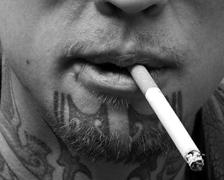[dropcap style=”font-size:100px; color:#992211;”]C[/dropcap]ome on, all the cool kids are doing it.
Another once-innocent victim falls to peer pressure, joining the lowlifes behind the bikesheds for an e-cigarette vape session.
Teens who tried to act cool in early adolescence were more likely than their peers who didn’t act cool to experience a range of problems in early adulthood, according to a new decade-long study. The study, by researchers at the University of Virginia, appears in the journal Child Development.
While cool teens are often idolized in popular media—in depictions ranging from James Dean’s Rebel Without a Cause to Tina Fey’s Mean Girls—seeking popularity and attention by trying to act older than one’s age may not yield the expected benefits, according to the study.
Researchers followed 184 teens from age 13, when they were in seventh and eighth grades, to age 23, collecting information from the teens themselves as well as from their peers and parents. The teens attended public school in suburban and urban areas in the southeastern United States and were from racially and ethnically diverse backgrounds.
Teens who were romantically involved at an early age, engaged in delinquent activity, and placed a premium on hanging out with physically attractive peers were thought to be popular by their peers at age 13. But over time, this sentiment faded: By 22, those once-cool teens were rated by their peers as being less competent in managing social relationships. They were also more likely to have had significant problems with alcohol and drugs, and to have engaged in criminal activities, according to the study.
“It appears that while so-called cool teens’ behavior might have been linked to early popularity, over time, these teens needed more and more extreme behaviors to try to appear cool, at least to a subgroup of other teens,” says Joseph P. Allen, Hugh P. Kelly Professor of Psychology at the University of Virginia, who led the study. “So they became involved in more serious criminal behavior and alcohol and drug use as adolescence progressed. These previously cool teens appeared less competent—socially and otherwise—than their less cool peers by the time they reached young adulthood.”
Source: Society for Research in Child Development
Photo: Carl Byron Batson. Not to be reproduced without prior permission.

Some of the news that we find inspiring, diverting, wrong or so very right.




















